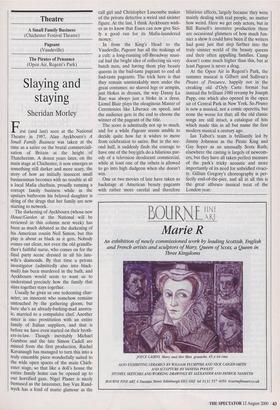Theatre
A Small Family Business (Chichester Festival Theatre) Pageant (Vaudeville) The Pirates of Penzance (Open Air, Regent's Park)
Slaying and staying
Sheridan Morley
First (and last) seen at the National Theatre in 1987, Alan Ayckbourn's A Small Family Business was taken at the time as a satire on the brutal commerciali- sation of Britain at the height of Thatcherism. A dozen years later, on the main stage at Chichester, it now emerges as something still darker and more scary, the story of how an initially innocent small businessman becomes with no trouble at all a local Mafia chieftain, proudly running a corrupt family business while in the upstairs bathroom his beloved daughter is dying of the drugs that her family are now starting to network.
The darkening of Ayckbourn (whose new House/Garden at the National will be reviewed in this column next week) has been as much debated as the darkening of his American cousin Neil Simon, but this play is about as black as it gets. Nobody comes out clean, not even the old grandfa- ther's faithful nurse, who comes on for the final party scene dressed in all his late- wife's diamonds. By that time a private investigator (admittedly also into black- mail) has been murdered in the bath, and Ayckbourn would seem to want us to understand precisely how the family that slays together stays together.
Usually he gives us one redeeming char- acter, an innocent who somehow remains untouched by the gathering gloom, but here she's an already-barking-mad anorex- ic, married to a compulsive chef. Another sister is into prostitution with an entire family of Italian suppliers, and that is before we have even started on their broth- ers-in-law. Though inevitably Michael Gambon and the late Simon Cadell are missed from the first production, Rachel Kavanaugh has managed to turn this into a truly ensemble piece wonderfully suited to the wide open spaces of the main Chich- ester stage, so that like a doll's house the entire family home can be opened up to our horrified gaze. Nigel Planer is nicely bemused as the latecomer, Issy Van Rand- wyck has a kind of manic glamour as the call girl and Christopher Luscombe makes of the private detective a weird and sinister figure. At the last, I think Ayckbourn wish- es us to know that Essex can now give Sici- ly a good run for its Mafia-laundered money.
In from the King's Head to the Vaudeville, Pageant has all the makings of a cult: a long-running off-Broadway musi- cal had the bright idea of collecting six very butch men, and having them play beauty queens in the bad-taste pageant to end all bad-taste pageants. The trick here is that they remain unmistakably men under the great costumes: no shaved legs or armpits, just blokes in dresses, the way Danny La Rue was always just a bloke in a dress. Lionel Blair plays the oleaginous Master of Ceremonies like Liberace on speed, and the audience gets in the end to choose the winner of the pageant of the title.
The score is admittedly not up to much, and for a while Pageant seems unable to decide quite how far it wishes to move from celebration to satire. But in the sec- ond half, it suddenly finds the courage to have one of the boy/girls do a hilarious par- ody of a television deodorant commercial, while at least one of the others is allowed to go into high dudgeon when she doesn't win.
One or two movies of late have taken us backstage at American beauty pageants with rather more careful and therefore hilarious effects, largely because they were mainly dealing with real people, no matter how weird. Here we get only actors, but in Bill Russell's inventive production there are occasional glimmers of how much fun- nier a show it could have been if the writers had gone just that step further into the truly sinister world of the beauty queens and their often appalling families. Camp doesn't come much higher than this, but at least Pageant is never a drag.
At the Open Air in Regent's Park, the summer musical is Gilbert and Sullivan's Pirates of Penzance, happily not in the creaking old d'Oyly Carte format but instead the brilliant 1980 revamp by Joseph Papp, one which also opened in the open air of Central Park in New York. So Pirates is now a musical, not a comic operetta, but none the worse for that; all the old classic songs are still intact, a catalogue of hits which made this in all but name the first modern musical a century ago.
Ian Talbot's team is brilliantly led by Jimmy Johnston as the Pirate King and Gay Soper as an unusually Scots Ruth; elsewhere the casting is largely of newcom- ers, but they have all taken perfect measure of the park's tricky acoustic and more importantly of its need for unbridled vivaci- ty. Gillian Gregory's choreography is per- fectly end-of-the-pier, and all in all this is the great alfresco musical treat of the London year.


























































 Previous page
Previous page